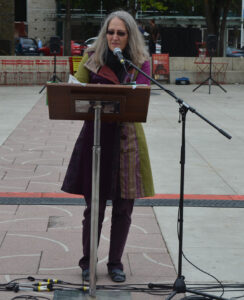By Shawna Bannerman
Even as one of the top sex workers in Canada, providing services to high-profile and well-known businessmen from around the country, Sara Hannah* did not feel empowered.
“The whole time that I sold sex…I always carried a bit of shame because I believe that it’s a dually exploitative relationship,” said Hannah.
“I very quickly learned it’s not this one-sided thing. It’s people in general hurting other people, both ways…there were a lot of times that I would see men also being hurt and being exploited and being reduced to nothing more than dollars and dehumanized.”
Hannah began her career by working at an exotic massage parlour in her early 20’s out of financial need. She didn’t fall into the sterotype of most sex workers; She came from a good family and was never a drug user.

Photo via Flickr
After her first 3 years in the industry, she had paid off her debts, completed a degree, bought a house and gotten married.
“I tried to [feel empowered], and I could mentally see how people could do it that way…They want to feel like they have control and agency, that they have choice because it helps you retain your spirit and your mental wellness,” said Hannah.
Hannah was having sex with 6 to 12 men every day. Many of her clients were well-known men who had flown from around Canada to book an appointment.
“I was able to make it through that whole experience by just disassociating. Literally by stepping out of my body every time that I would have to have sex with a stranger,” said Hannah.
After years of selling her body, Hannah began to forget who she was. She became consumed by the industry, and kept getting further from the normal life – happily married with children and a ‘regular’ job – that she craved.
“After a few years I started to notice that I was numbing out so much and being this alter ego so much that I was really losing my personal sense of identity,” said Hannah.
Her boyfriend at the time encouraged and supported her, financially and emotionally, to leave the industry.
Now, in her mid-thirties, Hannah is passionate about advocating for a safer environment for women who work in the industry and for those who choose to exit the industry. She also seeks to educate men about the dangers and risks associated with sex offending.
The Centre the End All Sexual Exploitation (CEASE) is one of the resources that many women turn to when they leave the sex trade. The not for profit works to provide support and resources to girls, women and transgender people who choose to transition out of the sex trade industry.
Kate Quinn, the executive director of CEASE, said that most individuals enter the sex trade industry for financial reasons. Some gain a sense of power from the work due to abuse they’ve experienced as a child, the ability to lift themselves out of poverty, or the need for control.
“Let’s say that as a child or a young person, you had power taken away from you[…]You would feel empowered because you were back in control[…]at the same time that power can be quickly taken away by the sex trade buyer because[…]he feels he owns you. He’s entitled because he paid you,” Quinn said.
Quinn says it’s a complex issue dependant on the buyer and the seller, and the circumstances surrounding both individuals.
“The power shifts back and forth, back and forth,” said Quinn.
Hannah said she’s only met three women in her career that genuinely enjoy and feel empowered by the work.
“There’s a super high turnover of people because not many people who do sell sex are able to really handle it for very long,” said Hannah.
“I often think that the ones that can handle it for very long are the ones that are just more effective at getting into that dissociative state.”
Although Hannah learnt a lot about herself from working in the sex trade, the benefits of the the inflated income, flexible hours, and all-expenses paid trips did not outweight the damage that the industry caused her.
“At the end of the day, the industry took much more from me than it ever gave me. It left me with just a sense of feeling like you can’t ever really know anybody, you can’t ever really trust anybody.”
*Name has been changed to protect the identity of the subject.





